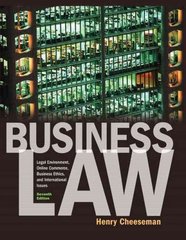Question
1.(25 points) Consider the following game, which illustrates Nobel Laureate Thomas Schelling's solution to the problem of how a kidnapped person can induce a kidnapper
1.(25 points) Consider the following game, which illustrates Nobel Laureate Thomas Schelling's solution to the problem of how a kidnapped person can induce a kidnapper to release him after the person has learned the identity of the kidnapper.
The game starts off with the kidnapper, say Alex, deciding whether or not to kidnap Bart. If he decides not to kidnap Bart, the game ends. Alex gets a payoff of 3, while Bart receives a payoff of 5.However, if Alex decides to go through with the kidnapping, he is successful, but there is a scuffle in which he is unmasked, so that his identity is revealed to Bart. This creates another problem for Bart, since Alex would now be inclined to kill Bart since Bart, if released could identify Alex to the police. Bart then decides whether to reveal something compromising/incriminating about himself to Alex that is not known to the rest of the world. (For example he could have embezzled funds from the company he works in or has had an extramarital affair his wife does not know about. Effectively, he is offering this secret as a "collateral" which Alex can use to ensure his silence). Whether or not Bart decides to tell his secret, Alex has to decide to either kill him or release him. If he kills Bart the game ends and payoffs to Alex and Bart are respectively 4 and 0. If he releases Bart, then Bart has to decide whether to tell the police or not. If Bart does not tell the police the game ends and payoffs to Alex and Bart are respectively 5 and 2. If Bart chooses to tell the police, however, there are two scenarios to consider. If he hasn't revealed his incriminating secret to Bart, the game ends and the payoffs to Alex and Bart are 1 and 4 respectively. But if he has revealed his secret to Alex, then Alex has to decide whether to reveal that secret to the world. If he does then the game ends and payoffs are 2 to Alex and 1 to Bart. If he doesn't the game ends with payoff of 1 to Alex and 3 to Bart.
After putting this into a game tree, I am having trouble visualising this in strategic form. Could you please point me in the right direction.
Step by Step Solution
There are 3 Steps involved in it
Step: 1

Get Instant Access to Expert-Tailored Solutions
See step-by-step solutions with expert insights and AI powered tools for academic success
Step: 2

Step: 3

Ace Your Homework with AI
Get the answers you need in no time with our AI-driven, step-by-step assistance
Get Started


